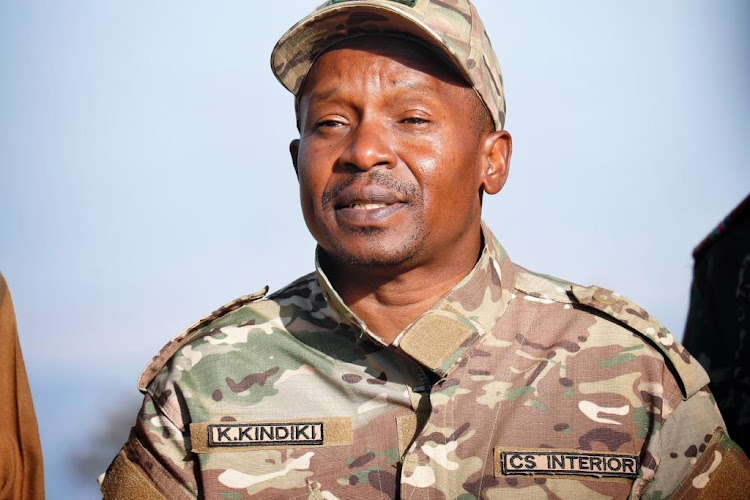•Kindiki said that the gangs continue to kill civilians and security officers.
•He argued the government has conclusively identified the survival lifeblood that must now be cut to neutralize banditry for good.
Interior Cabinet Secretary (CS) Kithure Kindiki has threatened to reveal the individuals benefitting from the perennial banditry in the North rift.
Kindiki said a three-week joint operation in the banditry-prone region by the National Police Service (NPS) and the Kenya Defence Forces (KDF) has generated intelligence linking a number of leaders to the banditry.
"The intelligence has unmasked the senior commanders, spiritual leaders, political patrons and the commercial beneficiaries working with the bandits. Before long, we will be laying bare the identity of the aforementioned individuals," he said.
He noted that one spiritual leader "who has been providing prophetic support" to the bandits has been apprehended.
"In a short while, we shall be circulating the names and photographs of these dark pillars of the evil network that is banditry," said Kindiki.
He, at the same time, revealed in the last seven months over 135 Kenyans, including 20 officers, have been killed.
The incidents happened in Baringo, Laikipia, Samburu, Turkana, West Pokot and Elgeyo Marakwet Counties.
This week alone, he added, nearly 12 Kenyans have been killed in Malaso, Pura and Kur Kur areas while six others have been murdered in Tot, Elgeyo Marakwet County. By Cyrus Ombati, The Star
"During the same period, dozens of schools have been closed, thousands of families displaced, and public amenities and infrastructure destroyed by these criminal gangs," he said.
Kindiki said that the gangs continue to kill civilians and security officers.
He argued the government has conclusively identified the survival lifeblood that must now be cut to neutralize banditry for good.
“This vice has been supported all along by a toxic mix of bad terrain, weapon supply and banditry leadership. What then must we do?”
He said despite the modest voluntary surrender of firearms that has taken place so far, there are thousands of guns, ammunitions, and other weapons in the hands of criminals.
"In the days and months ahead, we shall collect every illegal gun, and every weapon in the hands of criminals, whether by voluntary surrender or by force."






